komentarz i artykuły z JMC fellows:
James Madison, ojciec Konstytucji
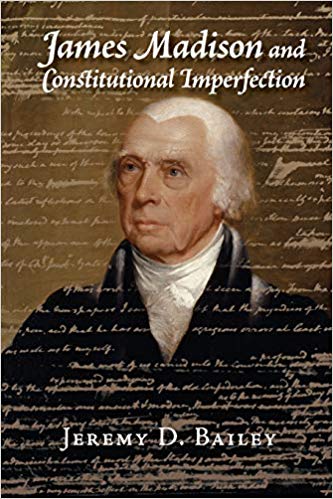 William Allen, niech Rada będzie dobra: obrona Demokratycznego nacjonalizmu Madison. (University Press of America, 1994)
William Allen, niech Rada będzie dobra: obrona Demokratycznego nacjonalizmu Madison. (University Press of America, 1994)
Jeremy Bailey, James Madison and Constitutional Imperfection. (Cambridge University Press, 2015)
Jeremy Bailey, „czy powinniśmy czcić to, czego nie możemy kochać? James Madison o niedoskonałości konstytucyjnej.”(Kwartalnik Badań Politycznych 65.,4 grudnia 2012)
Jeremy Bailey, „czy James Madison kiedykolwiek za Kartą praw?”(Perspectives on Political Science 41.2, 2012)
Luigi Bradizza, „Madison and Republican Cosmopolitanism.”(Cosmopolitanism in The Age of Globalization: Citizens without States, University Press of Kentucky, 2011)
Matthew Brogdon, „Constitutional Text and Institutional Development: Contesting the Madisonian Compromise in the First Congress.”(American Political Thought 5.2, April 2, 2016)
James Ceaser, ” w obronie rozdziału władzy.”(Czy podział władzy działa?,, American Enterprise Institute, 1986)
 Mark David Hall, „Jeffersonian Walls and Madisonian Lines: the Supreme Court' s Use of History in Religion Clause Cases.”(High Court Quarterly Review 5.3, 2009)
Mark David Hall, „Jeffersonian Walls and Madisonian Lines: the Supreme Court' s Use of History in Religion Clause Cases.”(High Court Quarterly Review 5.3, 2009)
Mark David Hall, „Madison' s Memorial and Remonstrance, Jefferson ' s statuty for Religious Liberty, and the Creation of The First Amendment.”(American Political Thought 3.1, Spring 2014)
Mark David Hall, ” The Wilsonian Dilemma.,”(Southeastern Political Review 25, 1997)
David Houpt, „Securing a Legacy: The Publication of James Madison' s Notes from the Constitutional Convention.”(The Virginia Magazine of History and Biography 118.1, 2010)
Jeffrey Morrison, „James Madison and Thomas Jefferson:' a Friendship Which Was for Life.””(A Companion to James Madison and James Monroe, Wiley-Blackwell, 2013)
Vincent Phillip Muñoz, God and the Founders: Madison, Washington, and Jefferson., (Cambridge University Press, 2009)
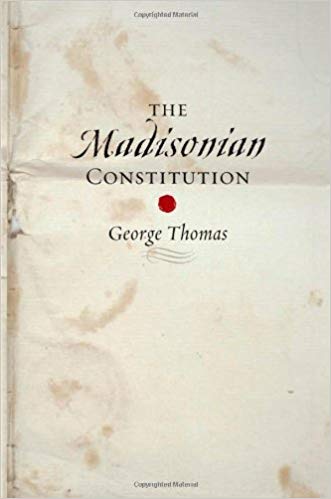 Vincent Phillip Muñoz, ” zasada wolności religijnej Jamesa Madisona.”(American Political Science Review 97.1, February 2003)
Vincent Phillip Muñoz, ” zasada wolności religijnej Jamesa Madisona.”(American Political Science Review 97.1, February 2003)
Vincent Phillip Muñoz, ” Religion in the Life, Political Thought, and President of James Madison.”(Religion and the American President, Palgrave MacMillan, 2007)
Peter Onuf, „Federalist Republican: Michael Zuckert' s James Madison.”(American Political Thought 8.2, Spring 2019)
John Ragosta, „Memorial and Remonstrance Against Religious Assessments” by James Madison.,”(Milestone Documents in American History, 2008)
S. Adam Seagrave, „Madison' s Tightrope: the Federal Union and the Madisonian Foundations of legal Government.”(Polityka 47.2, Kwiecień 2015)
John Scott (współautor), ” Capitol Mobility: Madisonian Representation and the Location and Relocation of Capitol in the United States.”(American Political Science Review 107.2, May 2013)
Colleen Sheehan, ” Civic Friendship in America: A Madisonian Retrospective.,”(Prawo & wolność, 3 września 2019)
Colleen Sheehan,”Deliberative Republicanism, political Communication, & suwerenność opinii publicznej.”(A Madisonian Constitution for All, National Constitution Center)
 David Siemers, „James Madison' s Presidency: Foreign Affairs.”(A Companion to James Madison and James Monroe, Wiley-Blackwell, 2012)
David Siemers, „James Madison' s Presidency: Foreign Affairs.”(A Companion to James Madison and James Monroe, Wiley-Blackwell, 2012)
David Siemers, ” Theories about Theory: a Typology of Theory Based Claims from the Case of James Madison.”(„Presidential Studies Quarterly 38.,1 marca 2008)
James Stoner, ” kompromis Madisoński: limity kadencji dla Izby, ale nie dla Senatu.”(Policy Review, Winter 1995)
George Thomas, ” Madison and the Perils of populizm.”(National Affairs 29, Fall 2016)
George Thomas, The Madisonian Constitution. (Johns Hopkins University Press, 2008)
George Thomas, „The Madisonian Constitution, Political Dysfunction, and Political Polarization.,”(Pergamin Barriers: Political Polarization and the Limits of Constitutional Order, University Press of Kansas, 2018)
George Thomas, ” Recovery The Political Constitution: the Madisonian Vision.”(The Review of Politics 66.2, Spring 2004)
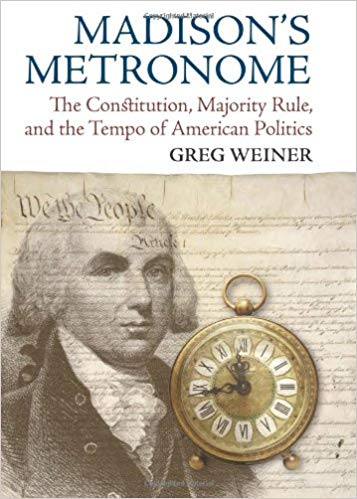 Gregory Weiner, ” James Madison i legitymizacja frakcji większościowych.”(American Political Thought 2.2, Fall 2013)
Gregory Weiner, ” James Madison i legitymizacja frakcji większościowych.”(American Political Thought 2.2, Fall 2013)
Gregory Weiner, Madison ' s Metronome: the Constitution, Mostory Rule and the Tempo of American Politics., (University Press of Kansas, 2012)
Gregory Weiner, ” majority and Madisonian Paradoxes.”(Extensions: Journal of the Carl Albert Congressional Research and Studies Center, Summer 2014)
Gregory Weiner, ” Our Constitutional Emergency.”(New York Times, 26 marca 2019)
Gregory Weiner, ” 'The Ultimate Justice of the People' Madison, Public Opinion and the Internet Age.”(A Madisonian Constitution for All, National Constitution Center)
Thomas West, „the Economic Principles of America' s Founders: Property Rights, Free Markets, and Sound Money.,”(First Principles Series Report, Heritage Foundation 32, 2010)
Keith Whittington, ” James Madison opuścił budynek.”(University of Chicago Law Review 72.3, Summer 2005)
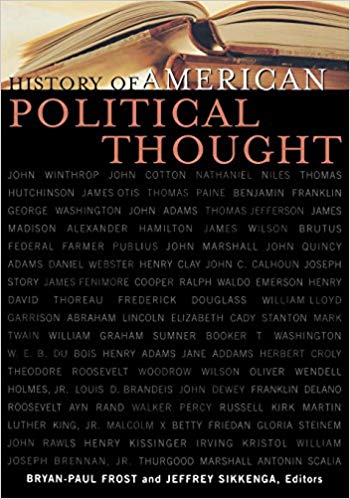 Jean Yarbrough, ” James Madison i współczesny Federalizm.”(Jak Federalna jest Konstytucja?, American Enterprise Institute, 1987)
Jean Yarbrough, ” James Madison i współczesny Federalizm.”(Jak Federalna jest Konstytucja?, American Enterprise Institute, 1987)
Michael Zuckert, „James Madison.”(Liberal Moments, Bloomsbury Press, 2017)
Michael Zuckert, „James Madison' s Political Science.,”(History of American Political Thought, Rowman and Littlefield, 2003)
Michael Zuckert, ” Judicial Review and the Incomplete Constitution: a Madisonian Perspective on the Supreme Court and the Idea of Constitutionalism.”(The Supreme Court and the Idea of Constitutionalism, University of Pennsylvania Press, 2009)
James Madison and The Federalist Papers
William Allen, ” The 'Baton Rouge Lectures.”” (The Federalist Papers: A Commentary, Peter Lang, Inc., 2000)
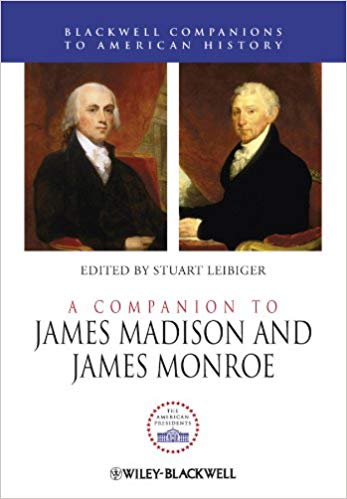 Charles Kesler (Redaktor), The Federalist Papers., (Penguin-Putnam, 1999)
Charles Kesler (Redaktor), The Federalist Papers., (Penguin-Putnam, 1999)
William Kristol, „the Problem of the Separation of Powers: Federalist 47-51.”(Saving The Revolution: The Federalist Papers and the American Founding, the Free Press, 1987)
James Stoner, ” The New Constitutionalism of Publius.”(History of American Political Thought, Lexington Books, 2003)
Gregory Weiner, ” After Federalist No.10.”(National Affairs, Jesień 2017)
Michael Zuckert, ” James Madison w Federalist.”(A Companion to James Madison and James Monroe, Wiley Blackwell, 2013)
Michael Zuckert, ” Who was Publius?,”(Enlightening Revolutions: Essays in honour of Ralph Lerner, Lexington Books, 2006)
Marbury v.Madison and Judicial Supremacy
Clyde Ray, „John Marshall, Marbury v. Madison, and the Construction of Constitutional Legitymization.”(Prawo, Kultura i Nauki humanistyczne 15.1, 2019)
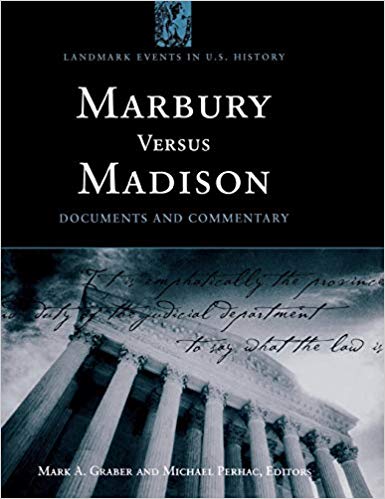 Clyde Ray, ” stara kontrowersja: Marshall, Whitaker i Marbury przeciwko Madison.”(Starting Points: A Journal of American Principles & American Practices, 27 lutego 2019)
Clyde Ray, ” stara kontrowersja: Marshall, Whitaker i Marbury przeciwko Madison.”(Starting Points: A Journal of American Principles & American Practices, 27 lutego 2019)
Keith Whittington (współautor), ” Making a Mountain Out of a Molehill?, Marbury i budowa kanonu Konstytucyjnego.”(Hastings Constitutional Law Quarterly 39.3, Spring 2012)
Keith Whittington, ” Marbury v.Madison and The Politics of Judicial Supremacy.”(Marbury v. Madison: 1803-2003 Un Dialogue Franco-Americain, Dalloz, 2003
Keith Whittington, „’to Support this Constitution': Judicial Supremacy in the Twentieth Century.”(Marbury v., Madison: Documents and Commentary, CQ Press, 2002)
* Jeśli jesteś kolegą z JMC, który opublikował na temat Jamesa Madisona lub jego myśli politycznej i chciałbyś, aby Twoja praca została tutaj uwzględniona, wyślij ją do nas na adres [email protected].